Text
The Asshole Playbook: ASPD Edition
A not-so-fond-look at classical antisocial moves, typed by a prosocial sociopath who is a sensitive and highly-self aware 27 year old woman who meets the criteria for Antisocial Personality Disorder.
Preface & Disclaimer This guide is not meant to diagnose anyone or imply that relating to its content means you have Antisocial Personality Disorder (ASPD). It also doesn’t claim that ASPD makes someone inherently “bad,” “abusive,” or even an “asshole” in the moral sense.
Here, asshole is used as a neutral descriptor. Everyone is an asshole in some way. This isn’t unique to ASPD. What is unique, however, is the finesse of assholery that comes from a deeply ingrained internal code, shaped by trauma, social conditioning, and survival. That finesse can serve as an asset, a coping mechanism, or a weapon, depending on the context, the self-awareness of the person wielding it, and their values (or lack thereof).
This guide does not excuse unethical, abusive, or illegal behavior. Instead, it explains the motivations behind those behaviors: the compulsions, calculations, justifications, and unconscious patterns often present in ASPD.
You may associate these traits with serial killers, abusers, or crime lords, and in some cases, you'd be right. But many of us live quiet lives in plain sight: holding jobs, forming relationships, functioning within the law (or close to it). And yes, some of us do care, just not in the ways people expect.
This is an insider’s perspective on how antisocial traits show up not just in harm-doers, but in survivors, chameleons, and even protectors. Because sometimes the asshole isn’t the villain. Sometimes, she’s just trying to get through the day without blowing her life up or popping some shitty coworker's tires.
Play #1: The Charm Bomb
"You’re so epic / nice / funny / great..." — me, to everyone I needed something from, meant it at the time, and forgot five minutes later.
What it is: The Charm Bomb is the social smoke grenade of antisocial strategy.
Drop it in any setting: workplace, date, crisis negotiation, group chat, and suddenly, you’re magnetic. You're funny, attentive, perceptive, confident, or even vulnerable, if it helps. You read the room like it’s a teleprompter. You make people feel seen and important, like they matter.
You disarm with a wink and a well-timed quip. You’re whatever they were hoping you’d be. It doesn’t feel fake. It isn’t fake. It’s just fast, and too fast to be sustainable, too tailored to be stable.
It works, until it doesn’t. Then they’re confused, and you’re annoyed. They’re emotionally invested, and you’re emotionally exhausted. You went in for smooth social engineering and left with a codependent follower.
The worst part? Sometimes you don’t even realize you’re doing it until it’s too late and you’ve written a check you can’t cash. You’re locked into a connection you didn’t mean to forge. Now someone’s texting you daily. Now they “thought you were different.” Now you’re the asshole, and not in the fun, harmless way.
How it looks in the wild:
Gassing someone up like they’re the protagonist of your week, only to never speak to them again.
Making eye contact like a romantic lead when you just want their lighter.
Becoming someone’s favorite coworker without even liking your job.
Accidentally creating a parasocial relationship in real time.
Why we do it:
Charm is control.
It buys time, space, compliance.
It protects, it preps, it prevents.
It feels better than brute force or cold detachment.
It’s a low-effort way to keep people predictable.
The risk: Charm can replace authenticity. You forget who you actually are under all the mirrors. Eventually, you don’t even know what you meant and what was just instinctual polish. You become slippery to yourself. You become a shapeshifter who can’t hold a shape.
How I cope now: I spot it faster. I slow down the rollout. I stop promising closeness I don’t plan to follow through on. And when I do drop a Charm Bomb, I try not to stick around for the fallout.
Those Who Use the Charm Bomb for Ulterior Motives
Sometimes, the Charm Bomb is calculated. It’s not just unconscious charisma spilling out, it’s weaponized likability. I want something you can provide:
Information
Money
A ride to the store because I’m too lazy
A favor you wouldn’t give me if I asked plainly
Food
Drugs
I’ve gotten prescription drugs I didn’t need from a doctor using this exact approach. I’ve softened up cops and walked away with a warning when I definitely deserved a ticket. I’ve manipulated my mother, my aunt, my father, my grandmother, and even close friends. I've walked away without getting a write up at work using this technique -- not that I didn't avoid accountability; I understood I did wrong, and I corrected the behavior, but I didn't want a document that paved the way towards termination.
Was I trying to hurt them? No. My intentions were self-serving, not malicious. When someone said no, I didn’t push; I pulled back with kind words and quiet understanding. I respected the boundary. But the charm was still used to get something, and I knew that.
And that’s the thing: this isn’t unique to ASPD. Neurotypicals do this all the time. People charm their way into promotions, free drinks, pity sex, forgiveness they haven’t earned. Someone doesn’t need a personality disorder to be a manipulative sleazebag creep.
The difference with ASPD is that we often know exactly what we’re doing, and how easy it is. We’re not surprised when it works. We’re surprised when it doesn’t.
When the Charm Bomb Fails Catastrophically
“I thought we had a connection.” “You’re not who I thought you were.” “You used me.” Oops.
Sometimes the Charm Bomb doesn’t go off the way you expect. It backfires. It implodes and takes the whole dynamic with it. This usually happens in one of three ways:
1. They got too attached, and now they feel betrayed. They thought the warmth was real, the attention was mutual, the connection was sacred. You were giving Main Character Energy and they started writing you into their long-term emotional script. And then you disappeared, went cold, acted indifferent, or treated them like a stranger because, to you, they were.
You were playing the role. They thought it was the real you, and now they’re spiraling, and you’re wondering how the hell this became your problem.
2. You oversold yourself, and now they expect consistency. Charm works best when it’s low stakes and short-term. But if you’re not careful, you accidentally brand yourself as the “caring, funny, generous” version of you, and suddenly you’ve got expectations to maintain. They text, they vent. They want hangouts, emotional labor, updates, and energy. Your grandma wants you to pay the fucking loan you took out in her name, and thank God she forgave you and gave you undue sympathy for your financial hardship. Couldn't be honest with her, so you burned that bridge. To reconcile: you never use your grandmother as a financial crutch ever again.
Now you're dodging their messages like they’re debt collectors and wondering why being “nice” got you socially trapped.
3. They saw through it. And now they hate you. They liked you, then clocked you: now it’s personal. The betrayal stings worse when someone realizes they were targeted. Even if you weren’t malicious, even if you did like them at the time, that realization curdles everything.
They’ll say:
“You’re fake.”
“You played me.”
“You’re a narcissist.”
“You’re emotionally manipulative.”
You might even agree with them. You might even feel bad, but it doesn’t matter. They’ve decided what you are, and now you’re the villain in their story.
When this happens:
Damage control is pointless. Anything you say will be taken as more manipulation.
Backpedaling looks like guilt (even if it’s just confusion).
Ghosting looks cruel.
Honesty looks like psychopathy.
Sometimes, the only winning move is to walk away and let the bomb do what bombs do: leave a crater.
Play #2: The Pity Script
"I feel really bad that I've hurt you. I was having a bad day, but you don't deserve that. I'm a horrible friend."
What it is: The Pity Script is the backup plan when the Charm Bomb doesn’t land, or when it does, but you need a reason to justify your inconsistencies, contradictions, or moral flexibility.
It’s a monologue, a memory dump, a curated trauma reel served cold and convincing. It’s the soft story underneath the sharp edges. You might use it after you’ve fucked up. You might use it before, preemptively. You might use it instead of a genuine apology. Not to be forgiven, but to be excused.
It’s not always intentional. Sometimes it starts as context. A little background to explain your actions. But it quickly morphs into justification or a defense. Manipulation, if you’re honest.
Sample lines from the script:
“I didn’t grow up learning how to handle emotions normally.”
“People like me don’t get second chances.”
“I’m the scapegoat of my family.”
“I don’t expect you to get it, but this is how I survive.”
“I know I seem distant; it's just really hard to trust people.”
What it accomplishes:
Lowers their guard.
Delays accountability.
Shifts focus from what you did to what you’ve survived.
Earns emotional credit you haven’t repaid.
Paints you as wounded, not dangerous.
Gets them to protect you instead of calling you out.
What it isn’t:
A lie. The trauma is probably real; the pain is probably real. But in this context, it’s being strategically deployed to redirect a situation you’re losing control of.
A real moment of vulnerability, unless you’re incredibly self-aware.
Fair to the person on the receiving end, especially if they’re not in a position to push back.
When it backfires:
They stop feeling bad for you and start resenting you.
They realize they’ve never actually seen you take responsibility for anything.
You tell a sob story so many times you stop remembering if it’s a memory or a script.
You accidentally collect a circle of trauma-bonded enablers who let you stay stuck, and now you can’t grow.
Personal example: I once used the Pity Script on a close friend after ghosting them for two weeks and then snapping at them when they reached out. I told them I was going through stuff. That I “shut down when I’m overwhelmed.” That it wasn’t personal. I cried a little. They comforted me.I should’ve just said: “I was overwhelmed, I hurt you, and I handled it badly.” But I didn’t, because I didn’t want consequences. I wanted comfort.
How I try to avoid using it now: I don’t share trauma to dodge criticism. I don’t fish for pity unless I’m genuinely drowning. And if I catch myself mid-script, I stop. I ask: Is this transparency, or manipulation disguised as pain? I read my messages and re-read my messages before I hit send. If it comes off as something that would annoy the shit out of me, I reword, bitch in private, and send the socially acceptable format that isn't going to light the match.
Because pain doesn’t make you innocent. It just makes you human. And humans still have to own their shit.
The Pity Script, Weaponized
Sometimes, the Pity Script isn’t survival: It’s strategy. It’s a guilt trip dressed in vulnerability. A calculated play. A sympathy heist.
This is when it’s not just self-soothing, or subconscious justification. This is when it’s conscious, intentional, and dirty. You know exactly what you’re doing, and you do it anyway because it works.
How it’s used maliciously:
You fuck up. Lie, cheat, steal, manipulate.
They catch on. You’re cornered.
Instead of apologizing or owning it, you collapse into sadness.
Suddenly, it’s you who’s hurt. You had a hard childhood. You’re misunderstood. You’re “scared of abandonment.” You “don’t know how to connect.”
You cry. You tremble. You say, “I know I’m broken.”
Now they’re apologizing, now they’re reassuring you. Now you’ve flipped the script and you’ve won.
What makes it malicious? You had the option to be accountable. You chose to exploit their empathy instead. You used your pain not to bond, but to bind them emotionally, morally, and psychologically.
You made them feel like hurting you back would be cruel. Like walking away would be abandonment. That’s not vulnerability; that’s coercion with a sad face.
Examples of this in action:
Crying during a confrontation to derail the conversation.
Trauma-dumping when someone is mad at you, so they forget why.
Using your mental illness as a threat: “If you leave, I don’t know what I’ll do.”
Blaming every toxic behavior on your past so no one can challenge it without looking heartless.
Framing yourself as the victim in advance, so if they retaliate, you can say, “See? I was right to be afraid.”
Why it’s dangerous:
It turns empathy into a trap.
It destroys trust.
It emotionally abuses people who care.
It trains you to never develop real accountability because pity becomes your shield and your sword.
Eventually, people see through it. And when they do? They won’t care about your pain anymore.
What I’ve learned: If you keep weaponizing your wounds, one day you’ll reach for them and realize they’re empty. No one’s listening. No one’s helping. They’re done because you trained them to stop trusting your hurt.
Pity stops working when people feel like they’re being played. And when that happens, even real pain starts looking like a scam.
Crying during a confrontation to derail the conversation. Used maliciously, this tactic short-circuits the dynamic. You confront them and they cry. Suddenly, you’re the aggressor. The conversation shifts from what they did wrong to how fragile they feel. You’re guilt-tripped into softening your tone, comforting them, dropping the issue entirely. They walk away without consequences. You walk away second-guessing your own damn anger. Author's Note: Not all crying during confrontation is manipulation. Sometimes, people freeze. They tremble or flip into a panic attack. They cry because their nervous system flips into full-blown survival mode. That’s not deception, it’s a physiological response.
If someone says, “I’m sorry,” or “I need a moment,” or “I understand." If they shakily nod, swallow, or sit in silence, they’re likely not manipulating you. They're overwhelmed. They're in a trauma response.
The difference lies in what happens after. Do they follow up? Do they take responsibility once they’ve self-regulated? Or do they twist the moment into a reason to avoid consequences, rewrite the narrative, or make you feel guilty for holding them accountable?
Manipulation is revealed in the aftermath, not the breakdown. So when you’re confronting someone with trauma, anxiety, BPD, or emotionally unstable traits, give space, but don’t give up your ground. You can be compassionate and hold a boundary at the same time.
Play #3: The Blame Game
“I wouldn’t have done that if you hadn’t pushed me.” “They twisted the story.” “People always try to paint me as the bad guy.”
What it is: The Blame Game is the core engine of the antisocial defense system: you never do anything wrong. Ever. It’s always someone else. They provoked you. Lied about you. Set you up. Misunderstood you. Overreacted. Took advantage of your good intentions.
In this play, you are not just innocent; you’re the real victim. And the best part? You believe it.
What it looks like:
Deflecting: “Okay, but what about what they did?”
Reframing: “I was just reacting to the situation I was forced into.”
Projecting: “They’re manipulative as hell. I’m just defending myself.”
Reverse victimhood: “I’m the one who got hurt in all of this, but nobody ever cares.”
Selective memory: Conveniently forgetting the part where you escalated, broke trust, or started it.
Why it works:
It hijacks the narrative. If people feel bad for you, they stop looking too closely at what you did.
It makes conflict emotionally confusing for others. Now everyone’s scrambling to figure out who’s “really” in the wrong.
It shields your ego. When your self-worth is fragile or performance-based, admitting fault feels lethal.
It creates plausible deniability. You get to lie to yourself and others in the same breath.
The Victim Framework of an Antisocial:
This is where things get twisted.
It’s not that you’ve never been a victim. Most people with ASPD traits have trauma, neglect, abandonment, abuse. But the Victim Framework turns that history into a weaponized worldview:
People are threats.
Everyone’s out to get you.
You’re justified in any reaction if you felt cornered.
Other people’s pain isn’t real; it’s manipulation. Yours is valid. Theirs isn't
Once this framework sets in, every confrontation feels like persecution. Every boundary feels like betrayal. Every “I’m hurt” feels like control. And every mistake you make gets buried under a pile of yeah-but-what-about-them.
How it becomes toxic:
You stop growing. Because you never own anything.
People get tired of playing therapist, mediator, punching bag.
You isolate yourself, and blame them for leaving.
You believe your own lies. Now you can’t even tell the difference between an actual injustice and your ego flinching.
Personal confession: I used to say, “They cut me off for no reason.” But there was always a reason. I just didn’t want to admit that I pushed people to their limit and then played shocked when they left.
Eventually, I realized I could either be right or be real. I started choosing “real.” Not always, but more often.
What I try to do now:
If I’m getting defensive, I pause.
I ask: “What part of this is mine?”
I don’t treat every accusation as an attack.
I let people walk away without needing to make them the villain.
Because sometimes I am the bad guy, and the only way to stop being one is to admit it when I am.
Sometimes the Blame Game Works
Let’s not pretend it’s always a failure. Sometimes it works brilliantly.
People believe you. They take your side. They pity you, protect you, cancel the other person for hurting poor, misunderstood you.
When you know how to tell a good story, and how to collect just the right evidence: the Blame Game can clear your name and destroy someone else’s.
I used to collect receipts. Not just for defense, but for ammo. Screenshots, out-of-context quotes, passive-aggressive texts, moments where they snapped because I pushed them hard enough. I framed it as “just keeping proof in case I needed it.” But really? I was setting the stage. Preparing the monologue. Lining up just enough smoke to make someone else look like the firestarter.
I used to run smear campaigns. Quietly and strategically. I’d plant doubt about someone’s character. Make side comments. Share “concerns.” Twist what happened just enough to make myself look like the one who was hurt, misunderstood, cornered. I didn’t lie, not exactly. I just omitted context. Let people fill in the blanks with whatever version of me they wanted to believe.
And when the other person inevitably reacted? Boom. More proof that they were unstable. They were dramatic. They were the problem.
Why it works:
Most people are conflict-avoidant. They don’t dig deeper. They accept the version of the story you give them, especially if you’re charming, credible, or the “calm one.”
People want to pick a side, and if you get to them first, you win.
Everyone loves an underdog. Play the victim well enough, and you’ll always have a crowd behind you.
But here’s the catch: Eventually, the patterns show. If every relationship ends with someone else being “abusive,” “crazy,” or “toxic,” people start to notice the common denominator is you. When someone finally gets bold enough to speak their truth, with their own receipts, it doesn’t just unravel one lie. It burns your whole credibility archive to the ground.
The long-term damage:
You lose people who used to believe in you.
You start to mistrust yourself. You don’t remember what’s real.
You become afraid of being “exposed,” even when you’re not doing anything wrong.
Your entire identity becomes based on staying ahead of consequences, not building something solid. Thankfully this has mostly worked in my favor because I have drawn in and exposed legitimate abusers, child predators, and other forms of pieces of shit who has turned the tables on me and successfully DARVO'D me, ruining my own reputation in the process. But let me be real: my methods weren't ethical nor are they noble. They were malicious. They gave the abusers and predators credibility to spin a victim narrative and get off scott free without taking actual accountability and responsibility for their actions. My drive is to paint myself as a victim of manipulation and abuse, to "win," even if I am a victim of their abuse. Accountability should still be had regarding my actions, because my actions have dragged other people into the controversy; I have even victimized their friends and partners when I felt cornered and was lashing out reactively.
What I try now: I don’t keep “just in case” files. I don’t pre-spin the story. I try to fix it with the person involved, or leave it alone. If they are actually dangerous, I report them to the platform and block. If they are doing something illegal, abusive, and disgusting and there happens to be anyone underage involved, I report them to the authorities. Because nothing I gained through a smear campaign was worth what it cost me later: reputation, relationships, and peace.
Play #4: Illegal Activity, Pushing Boundaries, Breaking Rules, and Testing Authority
“What are they gonna do, arrest me?”
What it is: The fourth play in the charm-offensive-turned-hostile survival system is simple: rules are suggestions, and authority is a dare. This one isn’t about charming or pitying anyone: this is about control, thrill, and power. It’s about establishing dominance in a system that’s already failed you. You know the rules. You just think they’re stupid, biased, breakable, or only apply to people without your audacity.
What it looks like:
Stealing “harmlessly” from work because they underpay you
Sneaking into venues, clubs, events, just to see if you can
Speeding, driving without insurance, unregistered vehicles, expired tags
Shoplifting, pirating, selling substances, cash-under-table jobs
Talking your way out of consequences like tickets or write-ups
Intentionally pushing curfews, parole conditions, or community norms
Breaking people’s boundaries just to see if they’ll enforce them
Gaming platforms’ rules, skirting bans, using alt accounts
Laughing off “minor” crimes because “everybody does it” or “I had to”
Why it works:
Short-term power: You feel untouchable, clever, even invincible for a moment.
Systemic disdain: If the system never protected you, why follow its rules?
Control: Rule-breaking puts you in charge. The law doesn’t own you, you own the loopholes.
Thrill-seeking: Risk makes you feel alive. The edge is exciting.
Disinhibition: If you’ve already been punished unfairly, why not earn the punishment next time?
What’s underneath it:
Most people who run this play don’t just hate rules; they hate the power imbalance behind them. If you grew up without control, with unstable environments or hypocritical authority figures, rules often became triggers. Not safeguards. They weren’t there to protect you. They were there to punish, humiliate, or keep you in your place. So breaking them became a form of resistance. Of reclaiming power.
But there’s a darker twist: You start believing the rules never apply to you. Not just the unfair ones. All of them. And when someone finally draws a line with you, you don’t respect it, you test it.
That’s when this play mutates into something more dangerous.
When it turns antisocial:
You don’t just break rules, you punish people for trying to enforce them.
You treat laws, ethics, and consent as obstacles instead of boundaries.
You escalate from bending to exploiting to abusing.
You believe remorse is weakness and consequences are a game.
You start grooming others to break rules for you, making them complicit.
Personal confession: I used to push people’s boundaries on purpose. Say something dark, outrageous, wildly inappropriate, just to see how they’d react. And if they let it slide, I’d keep going. That was the test. If you didn’t stop me, you didn’t care. If you did, you were weak. It was a game of dominance dressed up as humor or edginess.
I also sped at 80mph and nearly wrecked despite my friend telling me to stop being stupid. I hit nitrous in a public parking lot, knowing full fucking well it was a misdemeanor in my state. Clocked 80 by a state trooper and wiggled my ass out of a felony for reckless driving. I made sexually inappropriate jokes that made my friends very uncomfortable, and got mad when they didn't confront me and instead called me weird and creepy behind my back. Smarter than the law. Smarter than everyone. The authority figure couldn’t tell me what to do, because they were all idiots or abusers anyway.
Sometimes I got away with it. Sometimes I didn’t. What I gained: ego inflation, respect for the audacity. What I lost: Real trust, resources, genuine control of the situation, and good reputation.
What I try now:
I ask: “What am I trying to feel by doing this?”
I separate “unfair rules” from “basic human respect.”
I listen when someone says “that made me uncomfortable.” I don’t double down.
I find better ways to feel powerful without dragging others into chaos.
I still hate some systems. But I don’t burn down every bridge just to feel taller than the ashes.
I ask myself can this be taken the wrong way, can this actually make someone very uncomfortable, especially for NSFW shit that involves them specifically?
Last thought: Not every boundary you break makes you a badass. Sometimes it just makes you reckless. And sometimes, it makes you a predator. Be honest about which one you’re becoming.
Play #5: Selective Empathy
"I feel your pain, bro. But I really do not care."
What it is: Selective empathy is the illusion of deep care filtered through calculation. It's being exquisitely sensitive to suffering, but only in people you like, identify with, or can use. It's switching between therapist and tyrant depending on who’s talking to you and how useful they are.
You may truly feel others’ pain, but not universally, not equally, and definitely not unconditionally. You give comfort like currency. You ration compassion. You offer insight, even intimacy, but always with discretion.
It’s not that you’re cold. It’s that you’re strategic. Most of the time, it isn't intentional.
What it looks like:
Consoling a friend in crisis, but mocking a stranger for the same thing
Crying over animal abuse videos while ghosting people who depended on you
Standing up for mental health except for your ex who “should’ve known better”
Feeling intense sorrow for someone’s trauma right until they challenge your behavior
Deeply empathizing with suffering but only if you control the narrative
Being emotionally intelligent yet cruelly calculated when angry or bored
When it’s a survival tool: This play often develops in people who were punished for being too sensitive. Overwhelmed by empathy as a child, you learned to shut it off in self-defense. You couldn’t afford to feel everything, so you began filtering it, only allowing yourself to care in specific contexts where it wouldn’t hurt or jeopardize you.
So now, as an adult, your compassion is curated. You can be devastatingly kind. But when someone loses your favor, you go cold.
Not indifferent. Cold.
The weaponized version:
Using empathy to mirror and hook people, then dropping them with no closure
Claiming moral high ground while refusing accountability
Telling yourself, “they deserved it” to justify cruelty
Withholding compassion to punish, control, or isolate someone
Playing “savior” until they stop needing you, then ghosting or resenting them
Faking concern to gather intel or gain social leverage
Selective empathy becomes dangerous when it’s no longer about protection, but about power.
Personal confession: I’ve told people I understood their pain while secretly rolling my eyes. I’ve empathized with someone in public and insulted them in private. I’ve used emotional language to get people to open up, only to later use that information in arguments or smear campaigns. And I’ve justified it all by convincing myself they “deserved” it, or that my trauma somehow outweighed theirs. That’s the lie I told myself to sleep at night.
But deep down, I knew: I was emotionally intelligent enough to hurt people, and I did.
What I try now:
If I only feel empathy for someone I like, I ask why
I resist the urge to withhold kindness to “teach a lesson”
I stop and ask: “Would I want to be treated this way if roles were reversed?”
I try to stay aware of my capacity to weaponize insight, and choose not to
I remind myself: selective empathy might keep you safe, but it also keeps you alone
Final thought: If your compassion has a scorecard, it’s not compassion. It’s control. And if you can only care when it suits you, eventually, nobody’s going to care when you need it.
Play #6: Oversharing as a Strategy & Performing Remorse
"Here’s my trauma. Here’s my shame. Let’s pretend this is connection."
What it is: Oversharing seems like vulnerability. It looks raw, open, brave. But sometimes? It’s a diversion. A social misdirection. A ploy.
You give someone your “darkest secret,” not because you trust them, but because you want to disarm them and distract them. Make them feel guilty, obligated, or too shocked to keep pressing. Make them think they know you, when all they’ve seen is what you handed them.
And remorse? You’ll serve that too, if it smooths things over. Say “I’m sorry” like it’s punctuation. Cry if you have to. Look wrecked. Say you’re working on yourself. Then do it all again next month.
Why it works (at first):
Oversharing floods the interaction. People feel awkward saying “hey, that’s too much”
It creates false intimacy quickly, especially useful in manipulation or trauma bonding
It makes you seem like the wounded party, even if you’re the one who caused harm
People confuse openness with honesty, even if it’s curated, self-serving, or manipulative
“Remorse” makes others feel like the conflict is resolved, even if nothing has changed
The flipside:
You might not be doing it consciously. If you grew up in chaos, your boundary radar is broken. You don’t always know what’s “too much” until after you’ve already said it. You may blur lines in hopes of connection. You might apologize reflexively just to avoid escalation. It’s not always strategic, it’s survival.
But other times?
You do know what you're doing. You lead with wounds to dodge accountability. You cry to end the conversation. You share dark truths so no one asks better questions. You say “I’m sorry” because it sounds better than “I don’t care.”
Signs you’re using this play:
You trauma dump early in conversations, especially with authority figures or new people
You apologize easily but change nothing
You confess past sins as a way to sound self-aware, not actually changed
You escalate emotionally to avoid deeper confrontation
You feel most powerful when someone is saying “No no, it’s okay—you’re doing your best”
You confuse attention or pity for affection or respect
Personal confession: I’ve told people intimate details about my life just to confuse them into staying. I’ve admitted past wrongs not out of guilt, but to make myself look brave for “owning it.” I’ve cried on cue in arguments I knew I was losing. And I’ve apologized not because I felt remorse, but because I needed the situation over.
That isn’t vulnerability. That’s social manipulation dressed as self-awareness.
What I try now:
Pause before sharing: “Is this appropriate for this moment?”
Ask: “Am I saying sorry because I mean it, or because I want this to go away?”
Be honest when I’m not ready to take accountability, instead of faking it
Practice real boundaries: give others space, and stop leaking everything just to feel seen
Understand: true connection is built slowly, not shocked into existence with secrets
Final thought: If you use your wounds as weapons, people will learn to flinch when you open up. And if you perform remorse instead of feeling it, eventually, even your real apologies will sound fake.
Play #7: Opinions as Weapons, Shields, and Bombs
"I’m just being honest." "No offense, but…" "Everyone’s entitled to their opinion."
What it is: The Opinion Play is a classic antisocial maneuver disguised as casual conversation. It looks like assertiveness. Feels like honesty. But it’s often about power and control.
You use opinions to provoke, dominate, or derail. To disguise cruelty as candor. To blur boundaries under the guise of “just saying what I think.” You treat disagreement like a personal insult, or a game to be won.
Sometimes, you really believe what you’re saying. Other times, you don’t believe any of it, you’re just poking to see what bleeds.
Three Modes of the Opinion Play:
The Weapon: You say the mean thing on purpose. You call it your “hot take” or “just the truth.” You punch down. You say what others are too polite to say. You enjoy the reaction—especially if they spiral. The goal isn’t clarity. It’s impact.
The Shield: You hide behind "everyone has a right to their opinion" when called out. You weaponize subjectivity. You play dumb, act misunderstood, or claim censorship when someone pushes back. You don’t want a conversation—you want a pass. The goal isn’t dialogue. It’s protection.
The Bomb: You flood the space with so many contrarian views no one can focus. You derail serious conversations with whataboutism, devil’s advocacy, or edgy takes. You pivot from topic to topic before anyone gets too close to something real. The goal isn’t insight. It’s deflection.
Why it works:
People are socially conditioned to "agree to disagree"
Conflict-avoidant people won’t call you out directly
You get to say cruel things with plausible deniability
You create confusion and reframe accountability as “censorship”
If you’re charming, people second-guess whether you meant it that way
When it backfires:
You alienate people who used to listen
You get branded as exhausting, edgy, or insufferable
You mistake silence for respect—it’s often just burnout
Eventually, people stop trying to talk to you at all
Personal confession: I’ve said things I didn’t believe just to stir the pot. I’ve hid behind “my opinion” when I was being cruel, judgmental, or bored. I’ve tested people by baiting them with polarizing views, to see if they could “handle” me. I’ve used opinions as armor to avoid vulnerability. I’ve played both sides in a conversation and walked away feeling smarter than everyone else— But lonelier.
What I try now:
Ask: “Am I sharing this to connect, or to control?”
Pause when I feel the urge to be the smartest, boldest, or meanest person in the room
Let go of the need to always be right
Stop arguing for sport, some things aren’t games
Learn to sit with discomfort, instead of dominating the room to escape it
Final thought: When your “opinion” is a sword, don’t be surprised when people stop turning their backs to you, and when you burn the bridge for fun, remember you still have to walk home alone.
Playbook #8: Conning Others Because Why the Fuck Not
"It was too easy. I didn’t even need to lie—just let them believe what they wanted." "If they’re that gullible, it’s not my fault." "I was bored. It felt like a game."
What it is:
Conning, scamming, scheming: not always for money, sometimes just for the thrill. This is antisocial behavior in its most distilled form: manipulation for gain, with minimal remorse. Sometimes it’s pragmatic, sometimes it’s playful, sometimes it’s pathological, but it’s always about control.
You're not just conning them out of something: they're offering it to you. All you did was spin the story, drop the bait, watch them lean in.
Why it happens:
Impulse — You saw an opening and took it.
Boredom — Real connection is slow. Conning is fast, risky, addictive.
Revenge — They deserved it. You just gave them what they were asking for.
Survival — Food, cash, a ride, a place to stay. You needed it.
Power — The rush of watching someone trust you while you’re gutting them emotionally, financially, or socially.
Forms the con might take:
Pretending to be someone you're not (emotionally, romantically, professionally)
Gaining trust quickly—then using it
Ghosting once the resource dries up
Lying by omission: letting them build the fantasy while you stay vague
Leveraging sob stories or fake emergencies
Flirting with people you don’t like for access
Weaponizing your intelligence or charisma to win, not relate
It works best when:
You're disarming and self-deprecating
You mix just enough truth into the lie
They want to believe you and they fill in the blanks
You have a sob story ready just in case you get caught
You always have an exit strategy
Why it’s dangerous (to you):
You start to believe your own lies
You forget what the real version of you even is
You burn bridges you might actually need one day
You attract other manipulators, and you will get played back
You mistake success for connection. Spoiler: it’s not.
Personal Confession:
I’ve conned people who trusted me. Sometimes I framed it as a “favor.” Sometimes as a “flirt.” Sometimes I pretended to be broken just so they’d hand me something I didn’t deserve. I’ve taken money, taken sympathy, taken advantage. And I told myself it was fine because I didn’t “really” hurt them. But they didn’t know that. And I didn’t care. Until I did. Until I looked around and realized no one believed me anymore, even when I was telling the truth.
What I try now:
Only ask for things I’d feel okay giving
Sit with boredom instead of creating chaos
Admit when I’m tempted to lie for attention, approval, or access
Let people say “no” without resenting them
Practice honesty, even when it slows me down
Final Thought:
The con only works if people still think you’re a good person. But once the illusion breaks, you can’t get it back. You didn’t beat the system you just rigged the game until nobody wants to play with you anymore.
Ending note:
This playbook offers an anecdotal glimpse into behaviors commonly seen in people with ASPD. It’s meant to shed light on patterns and survival strategies. It is not to excuse, justify, or minimize abuse or harm.
If you want to take all of this with a grain of salt, and honestly believe that anyone who fits this mold is a Ted Bundy-level axe murderer just one bad choice away from reenacting American Psycho, that’s your prerogative. You’re absolutely entitled to your own interpretation of this entire blog post
Remember: having a personality disorder doesn’t grant immunity from being an asshole. In fact, it can sometimes amplify the assholery.
So take it or leave it, just don’t mistake explanation for exoneration.
32 notes
·
View notes
Text


Peng Chang by Leslie Zhang for Vogue China June 2025
652 notes
·
View notes
Text

New York City ballet production of Midsummer Nights Dream
264K notes
·
View notes
Text
it's so wild when your parent changes when you become an adult. my dad is very cordial and non confrontational - he regularly helps me with adult stuff like changing the oil or providing insurance tips. he's always smiling when i call him on video and providing jokes when i complain about college
when i was a kid, i would have to tiptoe around his anger issues often, sometimes running quietly past his work table until he got his own place completely separate from our family, locked away for days. every so often he would start screaming in the car and trying to hit me or my brother for talking too loud while my mom attempted to calm him down as he swerved on the road. and now he, smiling, helps me with car insurance.
like oh, this is just who you are when you have power over someone, and this is who you are when you dont have power over someone. no wonder you can have a normal life, friends, work while scaring the shit out of your kids and wife. i see it now. i see why no one would have believed me. that, i think, is one of the core fears of trauma - seeing the outside of it from the perspective of other adults that brushed you aside, and understanding. of course, that understanding gives the opposite of solace; it just gives you more grief with nowhere for it to go
21K notes
·
View notes
Text

embroidery sampler with a poem, england, silk on woolen canvas c. 1800s.
182 notes
·
View notes
Text
nobody ever asks if the so called “mind controlling false god” might just have like really cool vibes or makes good points about things or is cute and people just like to do what she says and think what she thinks and be what she wants
3K notes
·
View notes
Text
So recently, an ex-crew member on Helluva Boss named Erin Frost came out and spoke about their horrible time working on the show. Viv apparently is worse than we could have imagined, I knew she was bad, but this is gross.
It’s upsetting that she overworks her crew so much that some are falling out of love with their passion…animation. Erin didn’t get fired either, they QUIT so it must’ve been a horrible experience.
The truth always comes to light and I wouldn’t be surprised if more crew members spoke up. I can smell a huge scandal in the near future, and I don’t think we’ll be talking about these projects for much longer. I just want people to SEE this, this kind of stuff always get swept under the rug.

////
I do hope Vivziepop realizes her wrongdoings one day, I feel like a scandal might happen considering other workers of hers have been mistreated in the past.
5K notes
·
View notes
Text
I love all books but sometimes you read a book and you’re like so were all 21 thousand of you blindfolded and at gun point when you rated it 5 stars
#they got the guy straight up doing raceplay and hitting her on walls and pushing her down the stairs and everyone in the reviews are like#omg .. jared is such an interesting character cant get enough of him only complaint was girl was too insufferable
36K notes
·
View notes
Note
i love TOL so much its actually gimving me brain worms im a huge comic nerd and it gives off the same vibe as some of my fav comics ever like serenity rose or lost at sea or the gulf it feels like an old alt 'classic' i wouldv read when younger and changed my brain chemistry (it still is)... so so good and your paneling and page layout and characterisation all make it flow so well and its so easy to get invested in the characters.. jamie and santiago are real and They are my Friends... their dynamic and world feel so lively and real.... i love how you play with comic conventions in using the thought/narrative bubble and turning it into voiced speech its so clever and awesome... your inking is so alive and dynamic... i havent been this ThinkingAbout a comic in ages. would buy in print. ps do u have any comic reccomendations/what comics inspires you?
Thank you so much!! This kind of manic obsession is what all true comic creators dream of, so it touches my heart <3
My main inspirations for making TOL were black and white comics I read as a kid but didn't fully understand at the time, like Bone, This One Summer, and (like you mentioned) Lost at Sea!
Lost at Sea in particular was a huge emotional cornerstone for me when I was younger, and was one of the main reasons I kept TOL in black and white. I read it when I was too young to really understand what the characters were going through, but I could tell there was something really emotionally powerful going on below the surface, and it stuck with me into adulthood. The fact that the world in that story had been abstracted by only existing in black and white only made it more mysterious and fascinating to me.
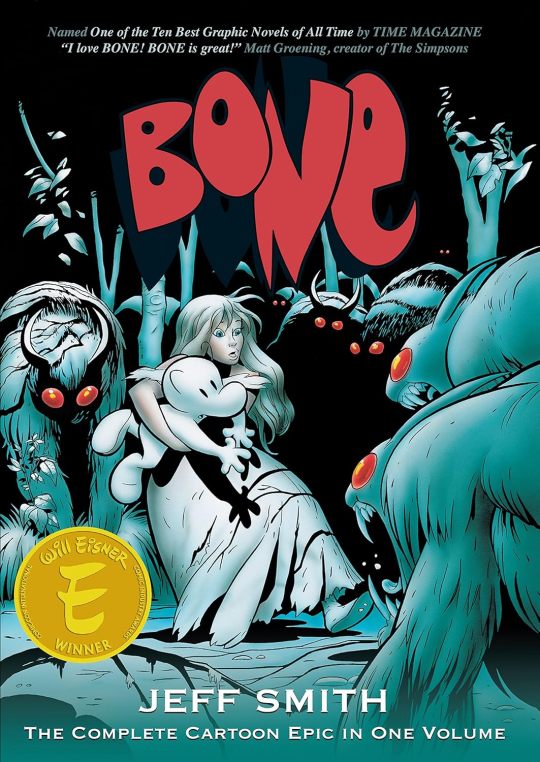


I have such an affinity for B&W comics. It simultaneously makes a piece feel more obtuse and obscured without the specificity of color, but it also makes it all the more personal and unique to each reader who fills in the gaps with their imagination. That's what I'm going for with TOL anyway.
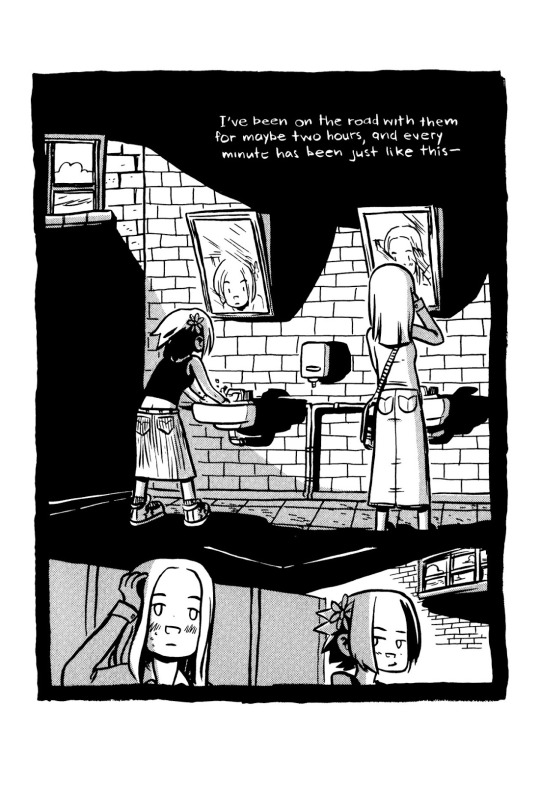
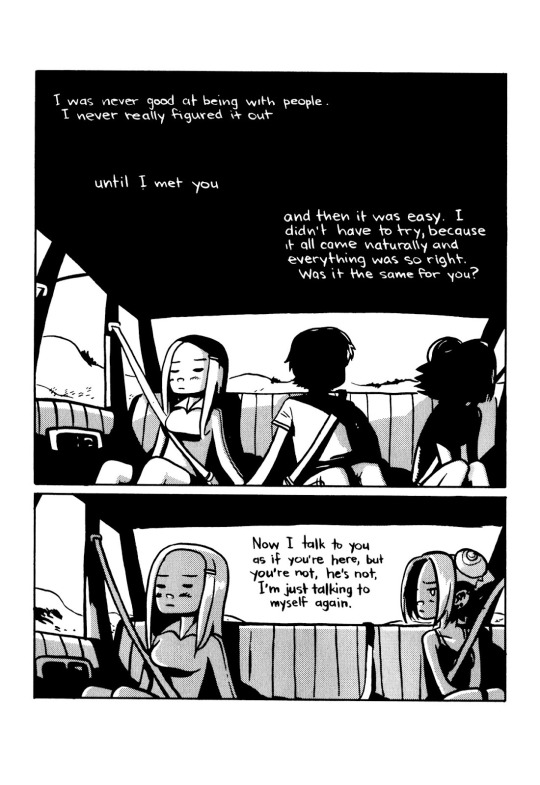
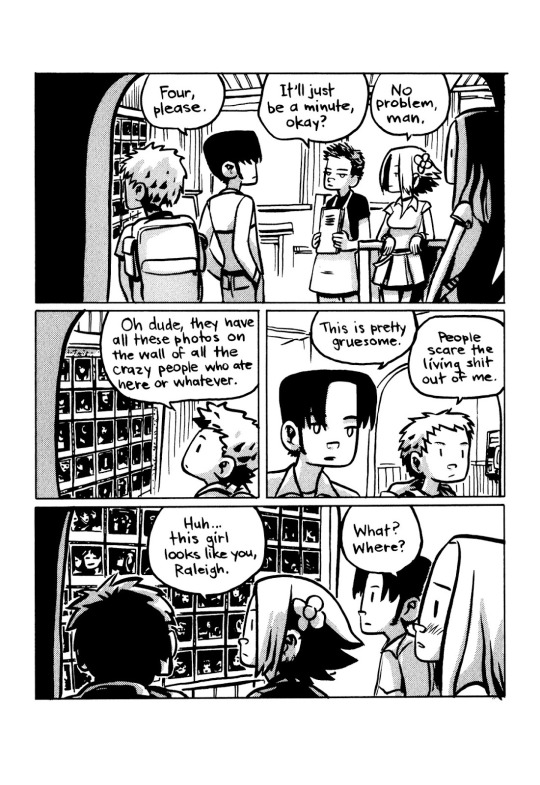
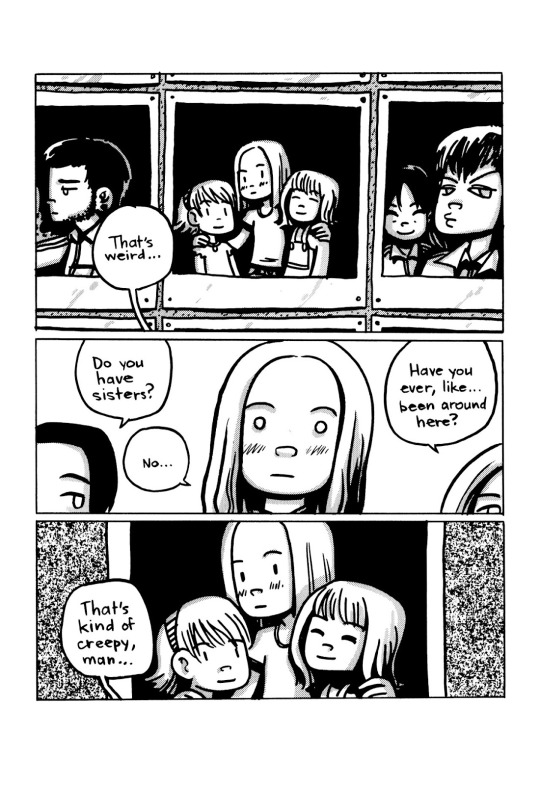
I know some people have only read comics like Bone and Scott Pilgrim in color because it adds a whole new level of artistic expression to enjoy in a story, but I encourage people to revisit their favorite comics if they were originally printed in b&w to see how different they feel without color.
As for other comics I recommend, I really love Blankets, Keeping Two, Ducks, and The Sculptor.

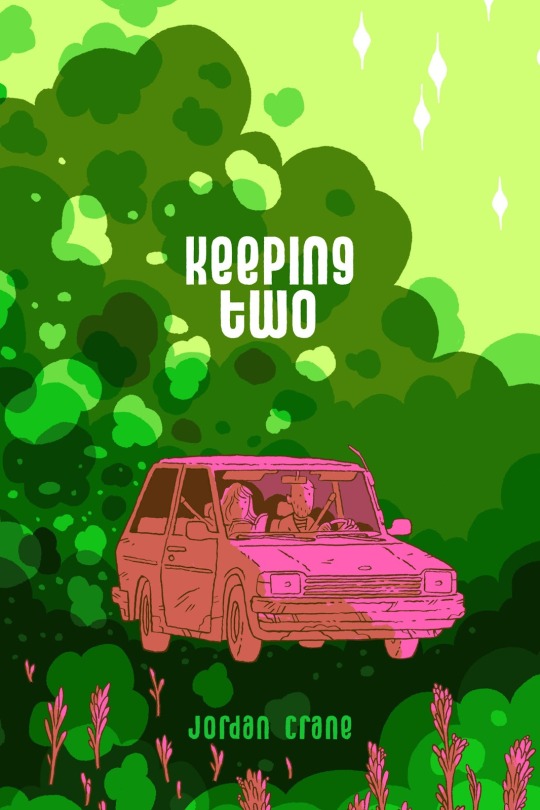
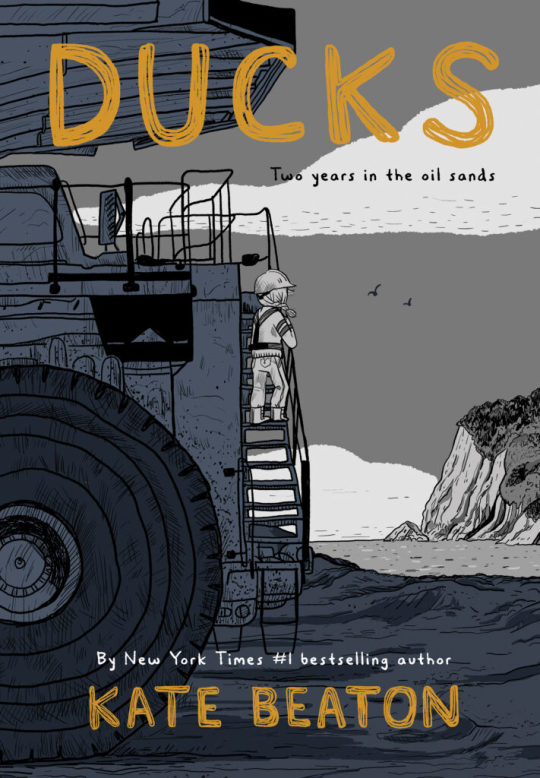
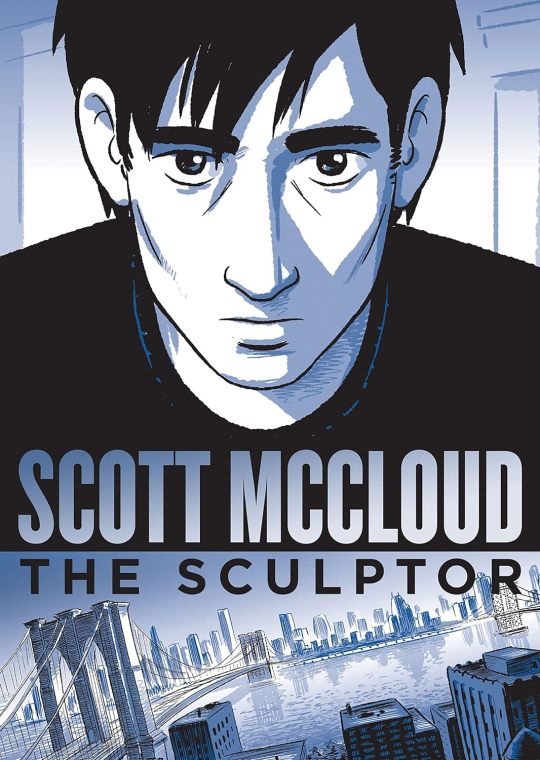
These are all sophisticated creme de la creme novels that really touch on some intensely beautiful themes, and I can't recommend them enough to people who want to read a comic with some real maturity.
But what if you like comics with action and fantasy and cool shit that are also top of the line? Then I recommend Kaya, Ultramega, Do A Powerbomb, and most importantly: Coda.
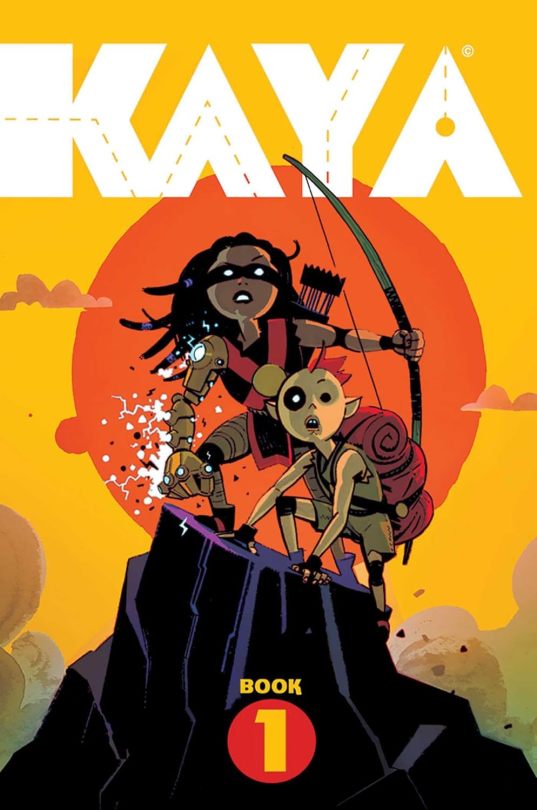

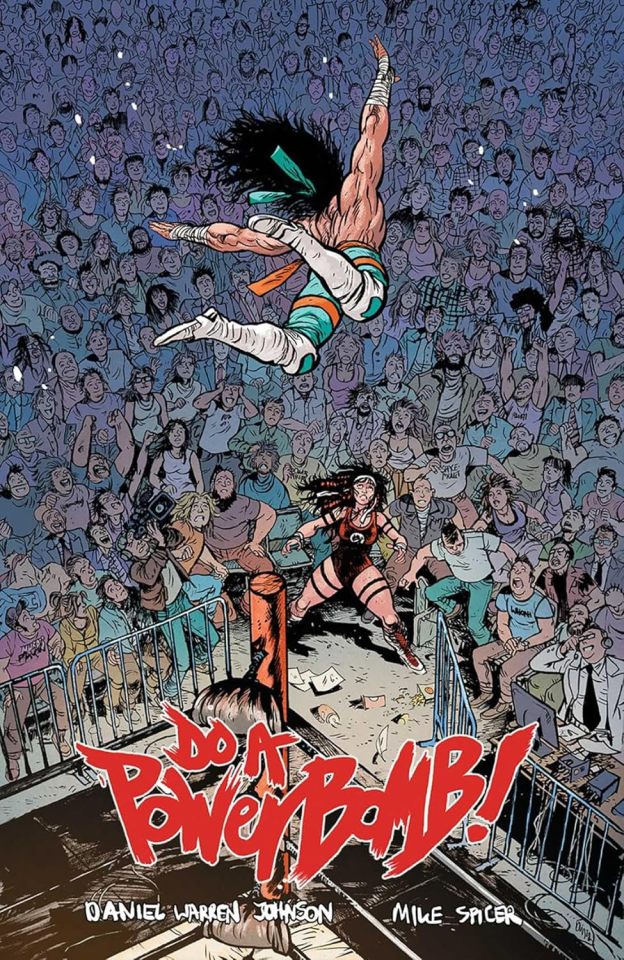
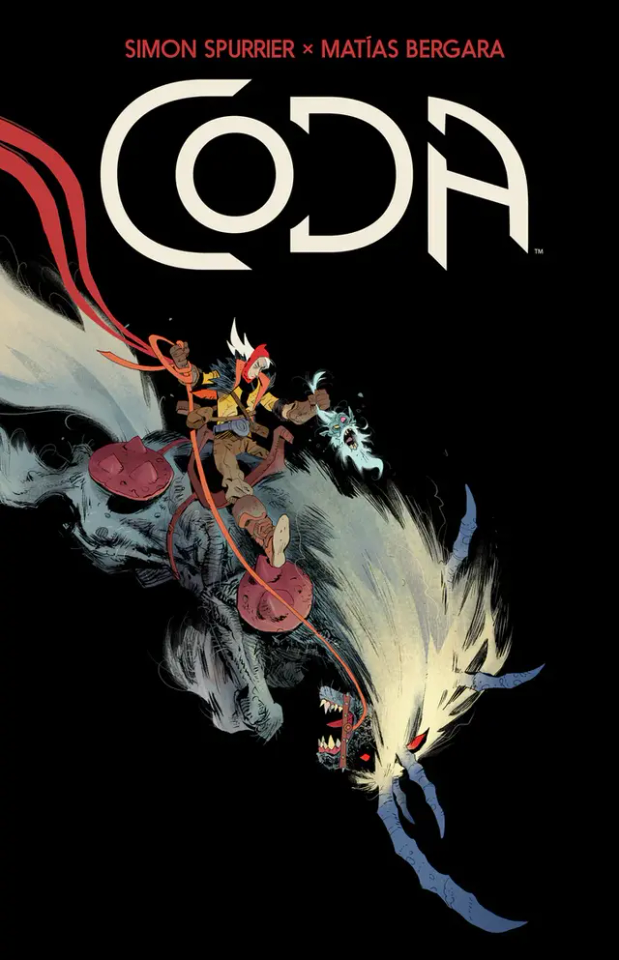
These comics are so amazingly well drawn and are told incredibly well, but Coda, drawn by Matias Bergara and written by Si Spurrier is probably my favorite comic ever and I recommend it to literally everyone. It's the comic that pulled me out of my era of reading shonen manga slop and made me start reading western comics obsessively.
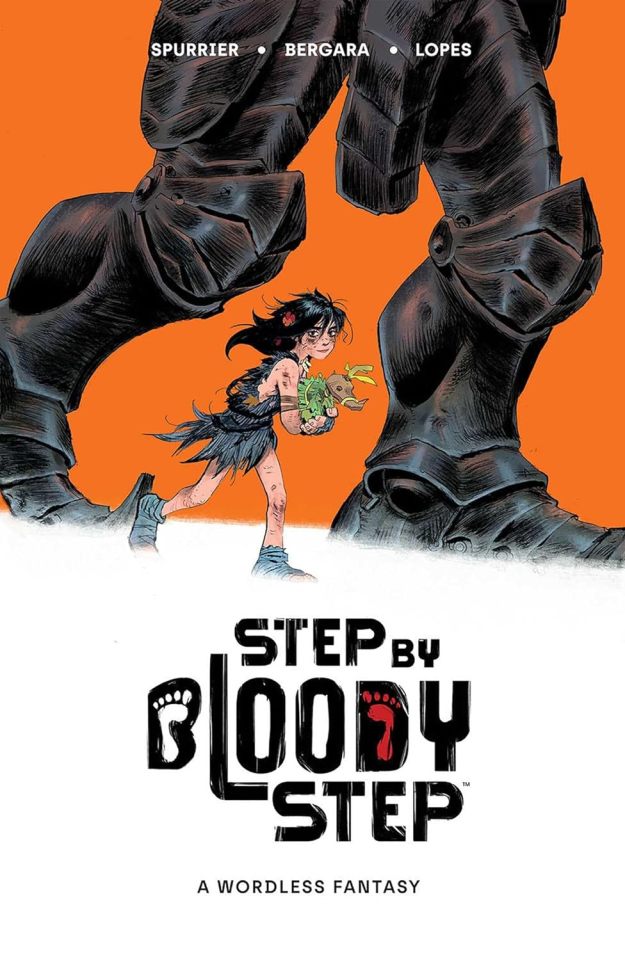
The duo also made Step By Bloody Step, a comic told without any words- only pictures. This is the kind of thing you have to read if you want to really understand what the comics medium is capable of.

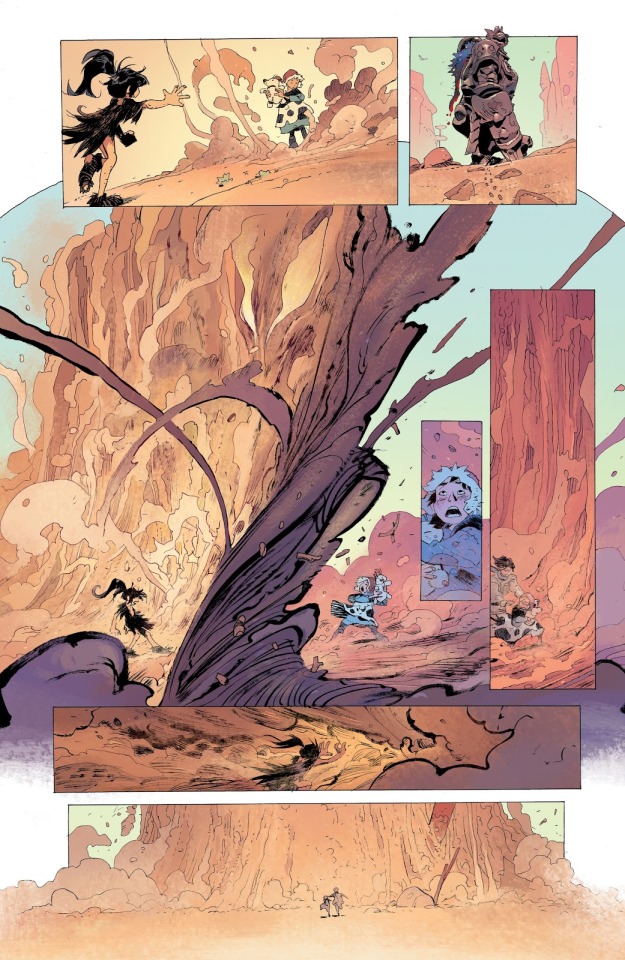


ANYWAY. That's my reading list. Creators like Hayao Miyazaki, Cliff Chiang, Moebius, Frank Pe, Kei Urana, and Ryoko Kui are also amazing and you should check out their works as well.
I'm making physical copies of TOL chapter 1, and at the end I'm also gonna include a reading list of comics made by indie creators who I'm lucky enough to call my friends for people to check out, but that's a post for a different time.
I hope people will read at least one book from this list. Thanks for reading my ramblings!
125 notes
·
View notes
Text


Une belle broche nommée "Medusa" du joaillier Fulco di Verdura en collaboration avec Salvador Dalí (1941). Une composition en or jaune , avec treize serpents entrelacés, aux yeux en rubis cabochons, encadrent une peinture miniature de la Méduse de Dalí, sertie d'une morganite de 73 carats...
A beautiful brooch named "Medusa" from the jeweler Fulco di Verdura in collaboration with Salvador Dalí (1941). A composition with thirteen entwined snakes in yellow gold, with cabochon ruby eyes, frames a miniature painting of Dalí's Medusa, set with a 73-carat morganite ...
278 notes
·
View notes
Text
listened to most of The Art of War while hanging clothes at my job earlier and I'm going to just distill down the real advice for y'all without the twenty thousand similes and metaphors and such
Wars are expensive have them really fast
Don't kill your soldiers they need food and stuff
But sometimes put your soldiers into inescapable life or death situations because that's how you really get them to be workin' hard instead of hardly workin', y'know
Have more guys than the enemy and be smarter. The best way to win a war is to have every single favorable condition for winning a war. Hope that helps
DO NOT fight in a salt marsh
If your boss gives you a stupid order, don't follow that order
Be 15 min early to the battlefield
Attack the enemy's weak points. But also they might be faking weaknesses so don't attack if they seem weak. But attack their weak points. But also-
For the love of god don't let anyone read omens
8K notes
·
View notes
Text
I hate I when I get an idea for a novel. Like oh no here starts the slow sad slip n’ slide to dissapointment again.
29K notes
·
View notes
Text
i dont consider myself a 'fashion guru' by any means but one thing i will say is guys you dont need to know the specific brand an item you like is - you need to know what the item is called. very rarely does a brand matter, but knowing that pair of pants is called 'cargo' vs 'boot cut' or the names of dress styles is going to help you find clothes you like WAAAYYYY faster than brand shopping
191K notes
·
View notes
Text
idk i dont mean this with as much derision as might bleed out but it is exceedingly clear that some of you were never considered retard-faggots as a child and therefore never subject to the subsequent torments Pure Children would subject Retard-Faggot Children to.
[* the use of these slurs is not reclamatory but is also not pejorative. the use of these slurs is academic, technical, and descriptive.]
#to read#← to save and read again at a later time because this is insightful and i dont wanna lose it
9K notes
·
View notes


